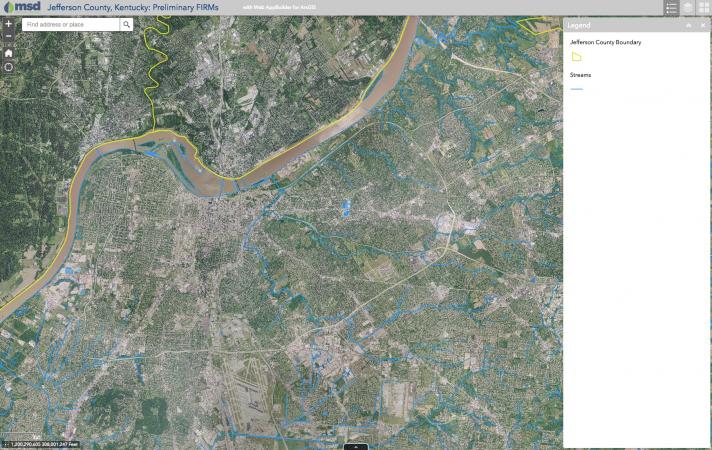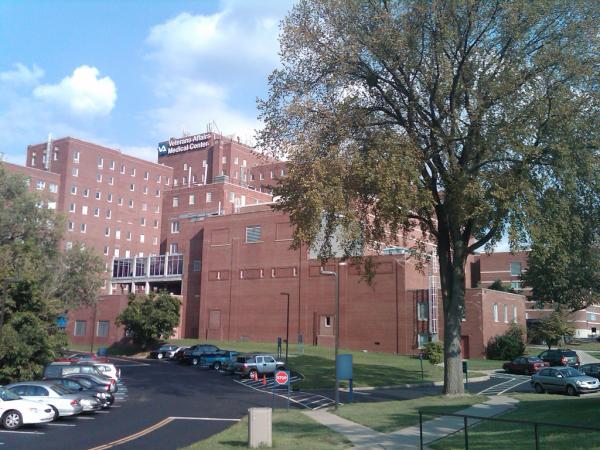MSD holds meetings concerning changes to floodplain maps

MSD is holding a series of open house meetings to discuss changes to existing floodplain maps by the Federal Emergency Management Agency (FEMA), which may affect your property’s floodplain status. Changes to the maps may affect your property’s flood status
MSD continues progress in repairs to one of Louisville’s most critical sewer lines
MSD continues to work as diligently and safely as possible to repair a large, 84-inch diameter sewer line that is more than 20-feet below Main Street. It is an emergency repair since this pipe carries 40 percent of the community’s wastewater to MSD’s Morris Forman Water Quality Treatment Center for proper treatment and release to the Ohio River.
Rock from MSD project used to create VA parking

Excavated rock from MSD’s Clifton Heights Combined Sewer Overflow (CSO) Basin became part of the base for a parking lot that helped remedy a parking problem at the Robley Rex Veterans Administration Medical Center on Zorn Avenue.
MSD, Louisville Water honor their veterans
Louisville MSD and Louisville Water Company took the opportunity on Friday, Nov. 9, to honor their employees who have given and continue to give to their country through service in the armed forces.
‘Bumblebee’ to carry on Ali’s legacy 18 stories underground

The legacy of Louisville’s own Muhammad Ali continues to live on as the name “Bumblebee” was unveiled for the MSD tunnel boring machine, which will excavate MSD’s Waterway Protection Tunnel underneath Louisville.
Waterway Protection Tunnel continues moving forward

A trip to Mt. Pleasant, Pennsylvania, about an hour southeast of Pittsburgh, gave MSD Engineer and Project Manager Jacob Mathis, P.E. and Engineering-Collections System and Construction Manager Greg Powell, P.E. an opportunity to see the tunnel boring machine that will create the Waterway Protection Tunnel. Mt. Pleasant is where tunnel contractor J.F. Shea Co., Inc. operates a facility to rebuild and test tunnel boring machines prior to shipping to a project site.
Tunnel Extension Means Less Disruption

MSD held a Public Outreach Meeting August 28th to share an update on the 1.5 mile extension of the Waterway Protection Tunnel and the elimination of the I-64 & Grinstead CSO Basin. Area residents were given the opportunity to ask questions about the extension and the project in general.
Main Street traffic reduced following discovery of new cave-in
A recently discovered sewer cave-in has forced Louisville MSD to reduce traffic on Main Street in the midst of other repairs to the same sewer line underneath the street.
The cave-in was found when video from a remote-control camera placed into the line for inspection revealed a hole in the side of the pipe. Debris, including abandoned pipes, have fallen into the large sewer line from this hole.
The cave-in wasn’t present when MSD last inspected this portion of the pipe on June 21.
MSD’s Waterway Protection Tunnel reaches 220-foot depth milestone

MSD contractors working to build a massive underground tunnel to prevent wastewater and stormwater from overflowing and entering the Ohio River and Beargrass Creek have reached a significant milestone. The “working” and pump station shafts — which will carry workers and equipment underground — have reached their full depth of 220 feet below the surface.
Rock samples from Waterway Protection Tunnel reveal Louisville history
MSD’s project to build a tunnel 18 stories underground for wastewater and stormwater storage has also unearthed hundreds of millions of years of history.


